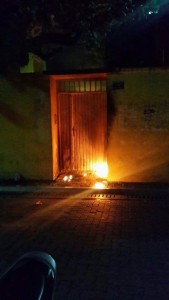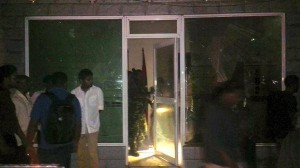The government has decided to stop dismantling huts in public spaces in Malé that police said are used exclusively by gangs, President Yameen revealed at a turf opening ceremony in Henveiru last night.
The process has been halted “until a solution could be found after studying the whole problem,” Yameen said, adding that the efforts were undertaken with “good intentions”.
“However, we believe that [dismantling huts] alone would not solve the problem,” he said.
The president’s comments came after Home Minister Umar Naseer – speaking at a separate event – had suggested there were around 30 gangs in Malé, describing 13 of these as “dangerous” criminal organisations.
President Yameen said he did not believe criminal activities would occur “every time youth congregate” in a neighbourhood spot.
Turning to “law enforcement” in all cases was not desirable, he continued, suggesting that youth could resolve problems through “constructive engagement”.
After police began dismantling huts in Malé on August 13 – claiming they were used for drug dealing and storing weapons used in assaults – groups of youth on motorbikes protested in the capital calling for the resignation of the home minister.
“Where are our huts?” chanted the youth groups.
Yameen meanwhile suggested that sports pitches, facilities, and tournaments for youth “could go a long way” towards reducing crime and resolving “stress and strain” among rival neighbourhood groups.
The turf ground opened last night was built by the State Trading Organisation for the TC and Kuda Henveiru groups.
Referring to MPs in attendance at the ceremony, Yameen urged politicians to work “as ambassadors” with “positive engagement” to resolve disputes among youth.
Yameen said Youth Minister Maleeh Jamal informed him that 10 futsal pitches would be completed during September.
“So a lot of work is being done to engage youth productively in their free time,” Yameen said.
“Releasing negative energy out of dissatisfaction is not the solution for anything,” he advised, adding that it leads to “bad blood” and “more negative energy”.
Conversely, constructive engagement either through dialogue or sports leaves “everybody better off,” Yameen said.
“I don’t doubt that you will use this facility in the right way and that ambassadors would be created through these sports activities as ‘peace ambassadors’ or ‘engaging ambassadors’ to find some relief for the strain in society,” he said.
“Crime wave”
Meanwhile, speaking at a ceremony held yesterday to mark the 10th anniversary of the Maldives Police Service – which was separated from the military and established as a civilian law enforcement body in 2004 – Home Minister Umar Naseer revealed that police have identified “more than 30 gangs” in the capital with about 50 “gang leaders”.
Of the 30 gangs, 13 were “dangerous” criminal organisations, Naseer said, adding that there were more than 500 members in these groups.
Referring to three fatal stabbings in recent weeks, Naseer said gang violence was “the biggest challenge” facing the police.
Police were the “front line” in a “chain” made up of the Prosecutor General’s Office, courts, and prisons, Naseer said, adding that the National Drug Agency (NDA) was an important link in the chain as street violence was connected to drug use.
“The government has resolved to stop the crime wave in the streets. God willing, in the coming days, we will announce strong measures,” he said.
President Yameen has tasked the home minister with formulating a “broad plan” to tackle gang violence, he revealed.
Naseer said conservative estimates suggested there were at least 10,000 drug users in the Maldives, of which 5,000 were unemployed.
Organised criminal gangs were composed of unemployed drug users, Naseer explained, which carry out assaults and robbery under the guidance of gang leaders.
While cases involving gang members were filed at court, Naseer said that gangs intimidate both judges and eye witnesses to prevent convictions.
“God willing, we are preparing an assault on this whole structure [of criminal gangs], which will come very soon,” he declared.
Four issues needed to be considered ahead of implementing the plan, Naseer suggested, advising a “realignment of our thinking”, with a stricter approach to drug users.
“In my view, all of our institutions should know very clearly that drug use is not a disease but a crime,” Naseer said.
Drug users should be punished harshly instead of being offered treatment, Naseer said, drawing applause from police officers in the audience.
However, he added, offenders would undergo rehabilitation while serving sentences.
“Liberalisation,” “excessive freedom,” and alleged calls for “decriminalisation” from politicians were encouraging youth to use drugs, Naseer argued, which created the impression that drug use was not a crime.
Naseer contended that a soft approach for drug users during the past five years had led to a rise in violent crimes.
“Do we stop this by caressing or through harsh punishment?” he asked.
“We cannot find a solution to the problem of stabbing and murders on the street without stopping drugs.”
Likes (1)Dislikes
(1)Dislikes (0)
(0) 

